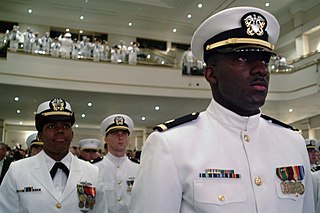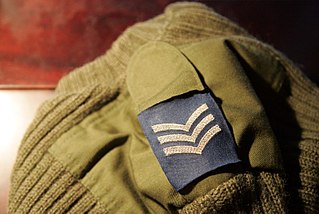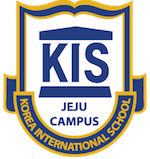
Postgraduate education, graduate education, or graduate school consists of academic or professional degrees, certificates, diplomas, or other qualifications usually pursued by post-secondary students who have earned an undergraduate (bachelor's) degree.
A bachelor's degree or baccalaureate is an undergraduate degree awarded by colleges and universities upon completion of a course of study lasting three to six years. The two most common bachelor's degrees are the Bachelor of Arts (BA) and the Bachelor of Science. In some institutions and educational systems, certain bachelor's degrees can only be taken as graduate or postgraduate educations after a first degree has been completed, although more commonly the successful completion of a bachelor's degree is a prerequisite for further courses such as a master's or a doctorate.
An academic term is a portion of an academic year during which an educational institution holds classes. The schedules adopted vary widely. Specific synonyms are commonly used to denote the duration or a term. In most countries, the academic year begins in late summer or early autumn and ends during the following spring or summer.
A postgraduate diploma is a postgraduate qualification awarded after a university degree, which supplements the original degree and awards them with a graduate diploma. Countries that award postgraduate diplomas include but are not limited to Bangladesh, Barbados, Belgium, Brazil, Canada, Chile, Colombia, Germany, Hong Kong, Jamaica, Spain, Kenya, South Africa, Sudan, India, Israel, Ireland, the Netherlands, New Zealand, Nigeria, Republic of Panama the Philippines, Portugal, Russia, Pakistan, Poland, Saudi Arabia, Singapore, Sweden, the United Kingdom, Sri Lanka, Trinidad and Tobago and Zimbabwe. Level of education and recognition differ per issuing country.
Officer Cadet is a rank held by military cadets during their training to become commissioned officers. In the United Kingdom, the rank is also used by members of University Royal Naval Units, University Officer Training Corps and University Air Squadron; however, these are not trainee officers with many not choosing a career in the armed forces.

The Virginia Tech Corps of Cadets (VTCC) is the military component of the student body at Virginia Polytechnic Institute and State University. Cadets live together in residence halls, attend morning formation, wear a distinctive uniform, and receive an intensive military and leadership educational experience similar to that available at the United States service academies. The Corps of Cadets has existed from the founding of the Virginia Agricultural and Mechanical College in 1872 to the present-day institution of Virginia Tech, which is designated a senior military college by federal law. As of August 2021, about 1,200 cadets are currently enrolled in the program.

The Pennsylvania State Police (PSP) is the state police agency of the U.S. state of Pennsylvania, responsible for statewide law enforcement. The Pennsylvania State Police is a full service law enforcement agency which handles both traffic and criminal law enforcement. The Pennsylvania State Police was founded in 1905 by order of Governor Samuel Pennypacker, by signing Senate Bill 278 on May 2, 1905. The bill was signed in response to the Great Anthracite Strike of 1902. Leading up to the Anthracite Strike, private police forces were used by mine and mill owners to stop worker strikes. The inability or refusal of local police or sheriffs' offices to enforce the law, directly influenced the signing of Bill 278. The Anthracite Strike lasted from May 15 to October 23, 1902, and ended with the help of Theodore Roosevelt, the sitting president at the time.

The Naval Reserve Officer Training Corps (NROTC) program is a college-based, commissioned officer training program of the United States Navy and the United States Marine Corps.

An aiguillette, also spelled aguillette, aiglet or aglet, is a cord with metal tips or lace tags, or the decorative tip itself.
Seoul Science High School for Gifted Students is an academy for gifted students interested in science. The school was established in 1989, and is located at Jongno-gu, Seoul. It was established as one of the 'Science High Schools' in Republic of Korea. In 2009, it has become an 'Academy for Gifted Students' selected by the Ministry of Education of Korea. Now, it is one of the eight such academies in Republic of Korea.
Korean Minjok Leadership Academy is a co-educational, independent boarding high school near the town of Hoengseong, Gangwon, South Korea, 120 kilometers (75 mi) east of Seoul at an elevation of 600 meters. Located on 1.27 square kilometers, it is one of the largest institutions in terms of contiguous area in the nation. One of the most selective secondary boarding schools in South Korea, KMLA is reputable for the placement of its graduates at eminent universities. KMLA is a member of the G20 Schools group.
This page details the uniforms and insignia of the Israel Defense Forces, excluding rank insignia. For ranks, see Israel Defense Forces ranks and insignia.

A shoulder mark, also called rank slide, or slip-on, is a flat cloth sleeve worn on the shoulder strap of a uniform. It may bear rank or other insignia. A shoulder mark should not be confused with a shoulder board, shoulder knot or epaulette, although these terms are often used interchangeably.
A super senior is a student in a four-year educational institution who has more than four years in attendance or a surplus of credits required for a diploma and has not yet graduated. In certain cases these students are also known as postgraduates.
The Turkish National Police Academy is a public institution of higher education in Ankara, Turkey dedicated to the training of police officers. It was founded in 1937 and has offered a four-year undergraduate program since 1984.
Daeil Foreign Language High School, located in Seoul, is one of the most prestigious high schools in South Korea. The private, coeducational, college preparatory school was founded in 1983 as the first foreign language high school to be established in South Korea aiming the goal of nurturing future global Leaders. Daeil offers the largest variety of curricula among all foreign language high schools in the nation. The school's primary language of instruction is Korean, regardless of which focus subject students choose when entering the school.
Republic of Korea Naval Academy is a four-year military academy located in Jinhae, South Korea. Established in 1946, it is the oldest of the 3 service academies of Korea. The school educates naval midshipmen for commissioning primarily into the Republic of Korea Navy and the Republic of Korea Marine Corps, and is administered by a superintendent with the rank of vice admiral.

Korea International School, Jeju Campus (KISJ) is South Korea's first international boarding school. The school is a sister campus to Korea International School and an affiliate of YBM, a publishing and English-language education services company. Founded in 2010 and first opened in 2011 as part of the Jeju Global Education City, the school's first senior class of 52 students matriculated in May 2016. KISJ is a proprietary, nonsectarian school offering an internationalized American college preparatory curriculum from Junior Kindergarten through Grade 12, with a boarding program starting in Grade 6. The high school began its AP Capstone™ in 2017–18, one of seven schools to offer it in South Korea.
Caverna High School is a small public high school located in Horse Cave, Kentucky, United States. Built in 1950, the school is operated by the Caverna Independent Schools, one of only a handful of school districts in Kentucky that are known to operate across county lines. In 1950, Horse Cave, located in Hart County; Cave City, in Barren County; and the Kentucky Board of Education held a meeting that approved the union of the two districts because of the low student numbers in both school systems. The actual construction of the new school did not start until 1951. Originally the school was going to be named, "Caberma." However, it was decided to stay with the name "Caverna."
The military ranks and insignia of Chile are the military insignia used by the Chilean Armed Forces.







